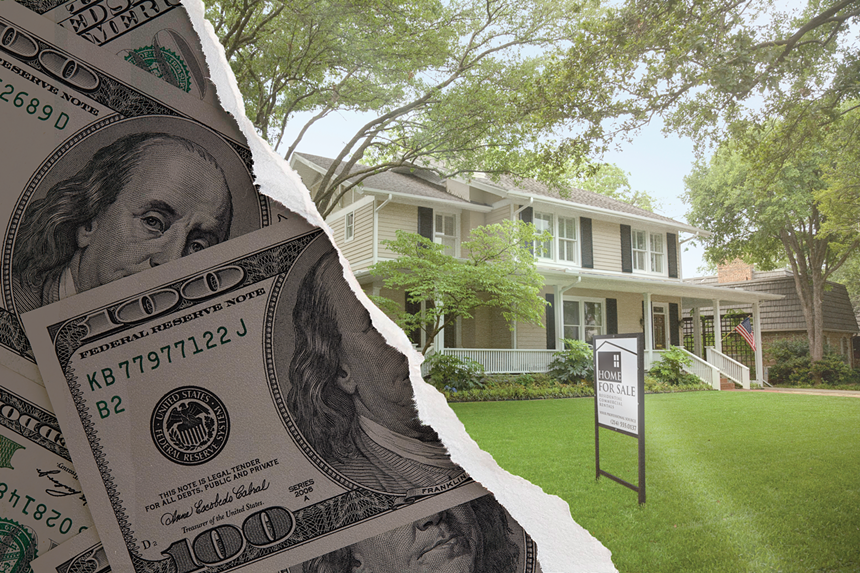Jack spoke to the Dallas Observer on the condition of anonymity because he’s still in the real estate industry.
In March, the National Association of Realtors (NAR) announced an agreement to end litigation of claims related to broker commissions brought on behalf of home sellers. The antitrust suit brought against NAR alleges the group artificially inflated commissions paid by sellers, which raised home prices. The settlement affects over one million NAR members across the country who had residential transaction volumes of $2 billion or less in 2022.
In the settlement, NAR denies any wrongdoing. Under the agreement, NAR is to pay the plaintiffs $418 million over about four years. The agreement awaits final approval from the court.
The settlement means a lot of things for the real estate industry. It could drop the commissions paid to real estate agents, putting more money in the pockets of people selling their homes. This could cause more people to list their houses for sale, potentially driving down prices overall. But there are worries. What happens to all the real estate agents who might not earn as much money? They could decide to leave the industry. Additionally, some buyers could get stuck covering the cost of their own agents or attempt to buy a home without one. That could be a challenging prospect for first-time homebuyers attempting to navigate an already complicated transaction.
No one with NAR was willing to comment directly because the settlement is still being worked out, but a spokesperson sent this statement: “We are pleased that the court has preliminarily approved the settlement because it is in the best interests of all parties and class members. It has always been NAR’s goal to resolve this litigation in a way that preserves consumer choice and protects our members to the greatest extent possible. This proposed settlement achieves both of those goals and provides a path for us to move forward and continue our work to preserve, protect, and advance the right to real property for all.”
According to CBS News, 9 in 10 home sales are handled by NAR-affiliated real estate agents. The organization is the largest trade association in the country.
Without the settlement, which could get a final approval hearing in November, people selling their homes generally pay a 6% agents’ fee that’s usually split between the buyer’s and seller’s agents. Late last year, the median sale price for a home was about $417,700 in the U.S. A 6% commission on that amount would be a little over $25,000, to be split between the buyer’s and seller’s agents.
Today, a seller’s agent advertises the buyer agent’s commission on something called the multiple listing service, or MLS, a detailed index of homes on the market that’s where most home sales originate. On the MLS, the seller’s agent basically says, “I’m going to offer the buyer agent 3% commission on any homes I’m selling.” This guarantees the buyer’s agent gets paid at the end of the day. That’s not how it’s going to work anymore.
Under the settlement, sellers’ agents can’t advertise the buyer agent’s commission on the MLS. This should remove incentives from a buyer’s agent to steer clients away from home listings with lower or no commissions. This could slash the fees split between the seller’s agent and the buyer’s agent by up to 30%, according to The New York Times.
Jack said the settlement largely revolves around decoupling the buyer’s and seller’s agents’ commission. Without the settlement, if someone puts a house up for sale, they’ll negotiate with the listing agent to decide the size of the commission and how much of it will go to the seller’s agent. That commission will come out of the seller’s proceeds from the sale.
"I think they are doing some meddling that’s going to have very wide-ranging consequences.” – Jack, local real estate professional
tweet this
“That’s how it’s always been,” Jack said. “It’s a system that has generally worked, and what they’re doing now [with the settlement], I think they are doing some meddling that’s going to have very wide-ranging consequences.”
Some are saying the settlement will make the market more competitive and potentially save homebuyers money. But those savings would most likely come out of real estate agents’ pockets, and Jack and others like him are worried about what this means for their future income.
“So, it's really taking the buyer’s agent commission and really altering how that’s going to be paid, how that’s going to be negotiated in a very substantial way,” Jack said.
But he and others say these commissions have always been negotiable. “That’s a bedrock foundational aspect here,” he said, though the common rate for commissions to buyers’ agents is generally 2%–3% of the sale price. “I have no doubt that that rate gets presented as maybe some kind of unspoken standard where it might feel or could be interpreted as some kind of non-optional price,” Jack said.
In practice, trying to get a buyer’s agent to negotiate a lower commission can be tough.
An NPR Planet Money podcast with a segment covering the trial behind the NAR lawsuit included a snippet from a previous interview with Allan Dalton, head of Real Living Real Estate. In the clip, Dalton explains his best practices for keeping a big commission, a technique he learned from one of his top Realtors. The Realtor had a client ask to reduce her commission by $10,000.
The technique is profanity-based, Dalton warns, but he decided to bleep out the swear words. “Here’s the technique,” Dalton says. “There's no bleeping, bleeping way I'm going to cut my bleeping, bleeping commission. What do you think, I'm a bleeping, bleeping hooker standing outside the Lincoln Tunnel at 3 o'clock in the morning giving bleeping, bleepings to sailors? If you think I'm going to cut my bleeping, bleeping commission, you can take this home and shove it up your bleeping, bleeping, and I know that it will fit.”
Try negotiating with that.
But Jack insists the size of the buyer’s commission is, in fact, negotiable. Every seller signs what’s called a listing agreement that lets the selling agent represent the seller. On this contract, the lines for the buyer and seller agents’ commission are blank, Jack said. “They’re blank for a reason,” he said. “You have to fill them in. You can fill them in with any number you want that you and your client agree on.”
He said he has routinely negotiated his commission, and he knows others do too. And he isn’t offended if someone wants to try to negotiate with him on commission. He considers it an open conversation. Whether he goes for a lower commission depends on the level of work involved in the property.
“I’ve been willing to take a lower percentage due to the overall factors,” he said. “Other times I have been less willing to go below the industry standard and have given them the option like ‘Hey, we’re going to stick to the 3%, and if that’s something you want to move forward with, great. If not, I understand.’”
He said the settlement has affected his outlook on the industry pretty negatively. “I’m not a clutch-my-pearls reactionary,” Jack said. “I very much believe in innovation and competition and finding a way to get better, whether it’s better income or better service for our clients. So, I believe in the market force in that way.”
So, when he first heard about the settlement and the pending changes he was open-minded, mainly, he said, because he didn’t know enough about it yet. “Honestly, we’re still not 100% exactly sure what the changes are going to actually be,” he said. And he has no idea how it will all shake out in the end. “The more I hear, the more concern I do have about the industry,” he said. “I definitely am concerned for buyers’ agents.” He said there are agents who work almost exclusively with buyers who will be affected by the settlement more immediately than others.
But he said sellers and their agents will be harmed too. “The seller, who’s not a Realtor or real estate professional, they’re going to think, ‘Oh, I don’t have to pay a buyer’s agent anymore. I’m going to save X amount of dollars.’ It’s not that simple because their home’s not going to be marketed as fully.”
On the buyer’s side, one of the big upcoming changes is that buyers’ agents will now have to enter into a formal representation agreement with a buyer before they even see the home. “That is a massive shift,” he said. “They’re asking ‘Hey, commit to me before we even know each other.’”

With changes coming soon to the way commissions can be listed on MLS, the way people buy homes could change too.
Sarah Schumacher/Getty Images
“So that buyer is going to not get anyone looking out for their best interest,” he said. “A buyer's agent works extremely hard. That's part of the tragedy of all this.”
They’re the ones on the road for hours on the weekends showing homes, he said. They’re the ones who are writing up offers at late hours of the night, sometimes with very little notice.
“They’re the ones having to counsel and educate and advise a first-time homebuyer or a distressed home buyer about how to win a deal, how to get into a home,” Jack said. “They’re the ones, so a buyer’s agent carries a heavy load.”
Without such an agent, homebuyers have no one representing their best interest. This could cause them to miss certain requirements and deadlines, costing them more money in the end.
“I think we’re going to see a high level of liability issues, a high level of contracts that terminate when they normally wouldn’t,” Jack predicted.
He said it’s hard to see who is benefiting from these changes. He is going to stay in real estate for now, but is considering his options “very seriously.”
It’s uncertain what the total effect of the settlement will be, but some think it will actually bring about little change.
“In my opinion, nothing really changes,” said Jay Narey, a local real estate agent.
Narey, who has 20 years experience in both residential and commercial real estate, said the main part of the settlement is that listing or selling agents will now be prohibited from publishing a buyer’s agent’s commission inside the MLS system. “Nothing prohibits them from doing so outside of the MLS, however,” Narey said. The listing or selling agent could instead post the buyer’s agent commission on their website, for example.
But going forward, Narey expects sellers will have to decide how much, if any, commission they are willing to offer in order to secure a buyer. On the other hand, buyers will have to decide if they wish to see properties where the seller is offering no or reduced commission and pay their agent themselves.
Sure, some Realtors may leave the industry, but Narey thinks this settlement will hurt home buyers more than Realtors.
“In my opinion, this settlement does not help or protect the consumer in any way,” Narey said. “On the contrary, it exposes buyers to potential exploitation by sellers.”
“In my opinion, this settlement does not help or protect the consumer in any way.” – Jay Narey, real estate agent
tweet this
Ashley Gentry, president of MetroTex Association of Realtors, has been a licensed Realtor for nearly 20 years. She’s a second-generation Realtor who co-owned a brokerage with her mother. “My mom didn’t want me to get into real estate,” Gentry said. “So, what does any good defiant daughter do? She goes and gets a real estate license.”
Gentry is the youngest female president of her real estate association, which has been around for about 100 years. She works mostly with residential properties but also has large investor portfolios.
To her, all of this change just makes the process less efficient. Now, sellers are likely going to have to negotiate the buyer’s agent's service fees. But sellers can still offer to pay those fees.
“I think we are still going to see a very cooperative landscape, but it is a big change,” Gentry said. There will be new forms, practices and procedures.
Whatever happens though, she thinks the industry will make it out alive in the end. “I got into the business when we were going from MLS books into an online MLS system and that was catastrophic,” she said. “I’ve practiced through the greatest recession of our recent times. … It’s changed, and a big part of what rocks this industry is just change.”
But she looks at this as an opportunity to get back to the basics. “I think technology has also made us a little lazy at times articulating our value proposition,” she said. “There was a way of doing real estate at the kitchen table even when I started in the business nearly 20 years ago that we’ve kind of gotten away from. So, I think it’s really forcing a lot of agents to get back to the basics, and that’s a good thing.”
Others may not have the same outlook, but she’s doing what she can to calm concerns.
“In a room full of Realtors, what I’m telling them is ‘Get back to business. Stop freaking out about what you can’t control and go out there and advocate for your clients and figure out the new tools you need to put in your toolbox.’”
She added: “A true professional is going to weather this storm. Yes it’s going to cause friction. Yes, it’s going to cause extra layers in what we do. But it can also be the great equalizer of professionalism. … If we can figure out that insane COVID market of real estate, I know realtors are going to be OK.”












